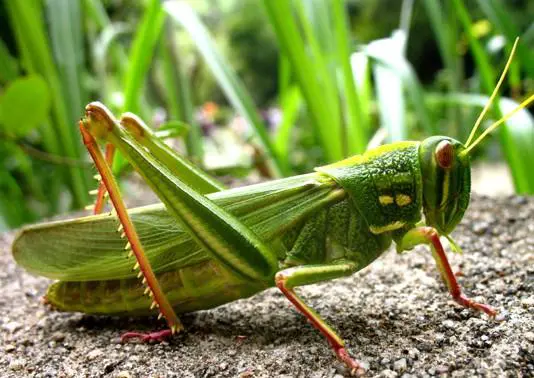By APD writer Muhammad Sohail
ISLAMABAD, Feb. 17 (APD) -- A panicked and worried Pakistani farmer named Asghar Ali has finally lost his fight against locust attacks that have destroyed all crops completely at his fields in the country’s eastern district of Sahiwal.
Ali and his family members have been trying their best to kick locusts away from their fields from dawn to dusk, but they have failed and now are ready to face financial problems and loans to run their daily life and prepare for the next crop.
“We only have heard about the locusts attack, but never faced them. When they came in millions in numbers, we did not know what to do. We just kept walking in the fields to kick them away, but failed and felt helpless,” Ali told Asia Pacific Daily (APD) on Sunday, adding that locusts left once crops of their whole village were eaten by the attackers.
Ali who borrowed money, seeds, and fertilizers for his different crops including wheat and vegetables is very anxious to pay back debt, meet his family expenditures and start fresh sowing season.
Locusts entered into Pakistan's southern Sindh province last year before moving to the eastern and northwest regions of the country. It is the worst locust plague in Pakistan faced in decades, which has devastated crops in parts of the country.
Pakistan faced such a worst situation of infestation of the pillaging insects in 1993. Now, the locusts are attacking the country’s areas already facing crop production and drought issues.
The United Nations' Food and Agriculture Organization has warned Pakistan about a serious threat of swarms in the future.
A huge number of locusts were first spotted in Pakistan’s southern port city of Karachi in November last year after around 59 years. However, the authorities did not take it seriously and termed it a migration process of the swarms.
Muhammad Bilal, an official in Pakistan’s Barani Agriculture University in Rawalpindi district, said that locust swarms can fly up to 90 miles per day and if conditions are suitable they can increase their numbers by 20-fold in three months.
“They can eat almost all crops and non-crop plants and historically they are considered the biggest threats to food security in large parts of the world,” said the official, fearing that the millions of locusts can become the country’s biggest issue in the future.
Followed by farmers’ plight reported in local media, Pakistani Prime Minister Imran Khan declared a national emergency on Feb. 1, 2020.
Following the emergency declaration, Special Assistant to Prime Minister on Information Firdous Ashiq Awan told media that the country is facing the worst locust infestation in more than two decades and the government has decided to declare a national emergency to deal with the threat.
Pakistan’s National Food Security Minister Makhdoom Khusro Bakhtiar told the parliament that locust swarms are currently on the Pakistan-India border around the Cholistan and the situation is unprecedented and alarming.
Talking about the actions taken to counter the attack, the minister said, “Measures have been taken against the insects over 121,400 hectares area with aerial spray at around 20,000 hectares. Local administrations, voluntary organizations, aviation division, and other concerned departments are involved in the campaign against the attack to save the crops.”
Locusts have also entered into India damaging crops and seeking attention from the government which has started spraying the breeding areas of the swarms near the India-Pakistan border area as they feared that they can come in huge numbers and bigger size in June this year.
According to local media reports, Pakistani and Indian authorities, despite having bitter relations, have already held five meetings to form a strategy to handle the plague.
Earlier on Feb. 9, Somalia also declared a national emergency against locust infestation after the menace swept the major parts of Africa destroying crops in the vulnerable region facing security and food issues.
The prevailing alarming situation demands Pakistan, India and other countries to form a regional strategy against the locusts otherwise the attacks can continue for years pushing millions of people below the poverty line and affecting development in the region.
(ASIA PACIFIC DAILY)
 简体中文
简体中文

